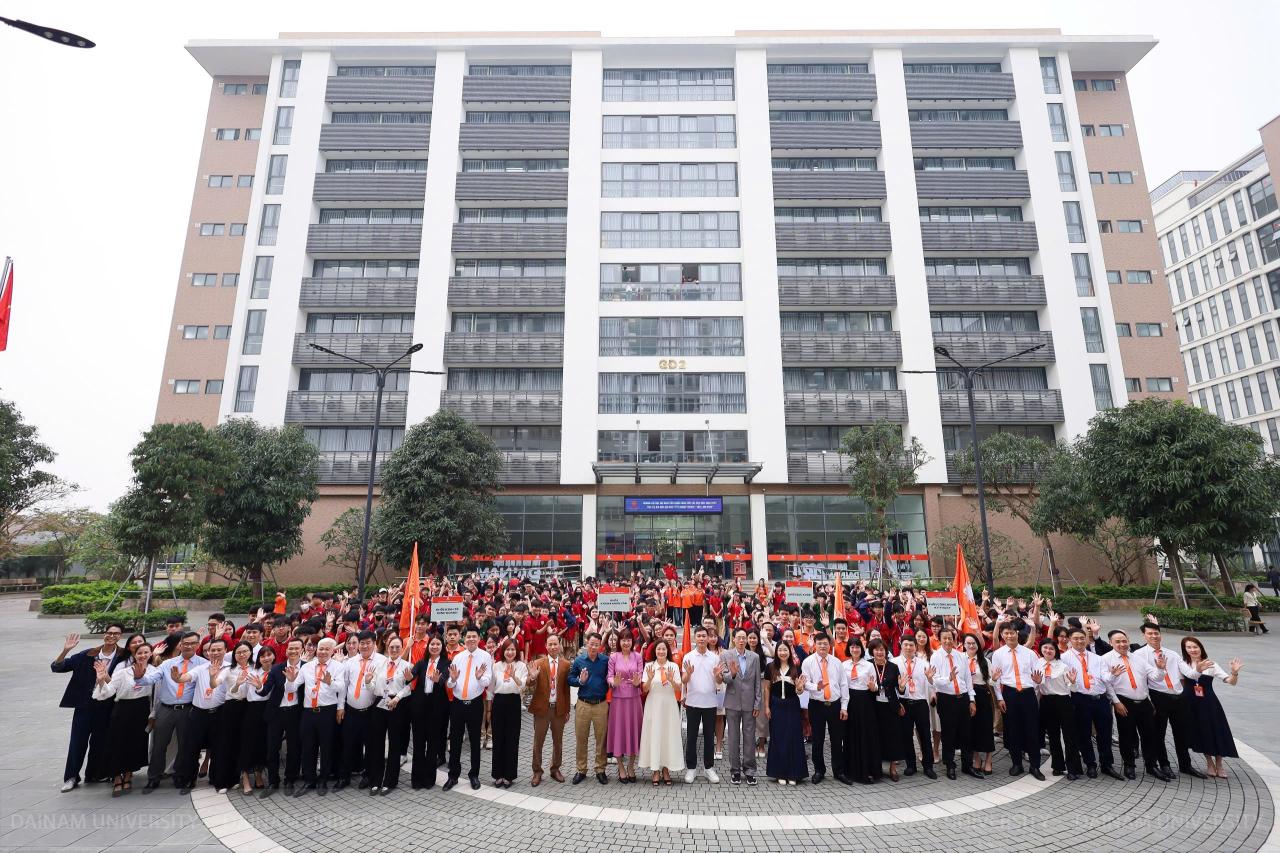Factors affecting the efficiency of capital use of enterprises today
Posted date 16/03/2018
13.202 view

Operating in a market economy, especially in the period of integration with the regional and world economy, Vietnamese enterprises have to face many difficulties, one of the major difficulties is capital.
MSc. Nguyen Thi Hong Duyen – Faculty of Accounting.
Operating in a market economy, especially in the period of integration with the regional and world economy, Vietnamese enterprises have to face many difficulties, one of the major difficulties is capital.
Capital is the key, the means to turn business ideas into reality, the efficiency of capital use determines the success or failure of a business, so any business is interested in capital and the efficiency of capital use.
Operating in a market economy, especially in the period of integration with the regional and world economy, Vietnamese enterprises have to face many difficulties, one of the major difficulties is capital.
Capital is the key, the means to turn business ideas into reality, the efficiency of capital use determines the success or failure of a business, so any business is interested in capital and the efficiency of capital use.
.jpg)
To further improve the efficiency of capital use in businesses, we need to consider the factors that affect it.
1. Capital structure:
Capital structure is a term used to indicate that a business is using different sources of capital with a certain proportion of each source to finance its total assets. Different businesses will have different capital structures, so the cost of capital will be different. Capital structure is related to calculating the cost of capital. In order to effectively use mobilized capital, managers must find a capital structure that is suitable for the specific situation of each business.
2. Cost of capital
The cost of capital is the cost of raising and using capital. It is measured by the rate of return that a business must earn on the capital raised to keep unchanged the required rate of return for the common stockholders or the company's own capital.
Capital mobilized for different enterprises will have different capital costs. For enterprises, capital is mobilized from the following sources: State-funded capital, bank loans, retained earnings, loans from other units, joint venture capital.
3. Business market.
Any business operating in the current conditions is also affected by the market. If the business's activities are not accepted by the market, the business is considered non-existent. So what factors ensure that the business is recognized by society? There are many factors but the indispensable factor is the business's capital.
Whether a business is strong or weak, whether it can compete with other types of businesses or not, mostly starts from the source of capital. Capital helps businesses to enter operations, but the market determines the existence of the business. The market affects both the "input" and "output" of the business. If the market is stable, it will create favorable conditions for businesses and have many opportunities to integrate into the globalization trend. On the contrary, if the market fluctuates continuously, it will cause difficulties for businesses such as: price fluctuations, consumption of goods, changes in consumer demand, preferences of market actors, ... and finally, it affects the costs of the business, in which capital efficiency is the factor that is considered and of primary concern to managers.
On the other hand, the market also plays the role of a place to regenerate capital for businesses to carry out production and expand business on the basis of promoting the efficiency of business operations.
4. Capital
When it comes to business operations, we immediately think of the issue of how much capital will generate large or small revenue. Thus, with a certain level of revenue, there must be a balance corresponding to a certain amount of capital.
However, that relationship is not always proportional to each other, it also depends on management efficiency and business capital. Each enterprise has different characteristics, but in summary, it usually includes the following capital: loans from banks and credit institutions, equity capital, state budget capital, joint venture capital, etc. So, how will capital affect the efficiency of capital use?
v For loans from banks and other credit institutions:
To have capital to use, businesses must pay for its use. This rate often changes depending on the state of the economy and the amount of capital borrowed by the business. On the other hand, businesses cannot borrow as much as they want, but it depends on the credit limit. If they exceed the limit, the bank will not lend anymore. Before mobilizing capital, businesses must consider the cost factor that they must pay for mobilizing it. This cost is part of the work on capital use.
v For equity capital:
As mentioned above, state-owned enterprises must operate effectively, preserve and develop capital, then the State will allocate capital to the enterprise. As for joint stock companies, they must ensure the required rate of return for investors... To obtain such capital, enterprises must achieve their business goals. To achieve business goals, enterprises must achieve capital efficiency.
v Other sources of capital:
Other sources of capital include: capital occupied by individuals, other units inside and outside the enterprise, joint venture capital - association, FDI capital, ODA capital, etc. When choosing an investment capital source for their capital needs, enterprises must consider and compare the profits brought and the costs incurred to obtain them, thereby determining for themselves an optimal capital structure with low costs. If the cost of capital is high, it will reduce the enterprise's profits and reduce the efficiency of capital use.
5. Business risks
Business risk is the risk inherent in the assets of a business in the case that the business does not use debt. The greater the business risk, the lower the optimal debt ratio. When risks occur, it leads to loss of reputation, loss of partners, loss of customers... and ultimately failure in business, poor capital efficiency. Therefore, to be successful in business, businesses must know how to accept risks, must know how to invest in the right direction, see which risks are acceptable and which risks are unacceptable.
6. Other factors.
a. Human factor:
Is the most decisive factor in ensuring effective use of capital in the enterprise. An enterprise with a team of competent, highly qualified and experienced staff, the ability to quickly absorb modern technology, creativity, ... will bring business efficiency to the enterprise and vice versa. In addition, with a team of competent and capable leaders and managers, it will have a significant impact on the efficiency of capital use of the enterprise. Because with this team, the enterprise will build for itself the best business plan, know how to fully utilize available resources, build good relationships with partners and customers, ... create a team from top to bottom that is united, compatible and effective. In addition, financial level is extremely important, the enterprise's accounting process is appropriate, the accounting data is accurate, then the financial decisions of the enterprise leader will have a scientific basis. Revenue and expenditure must be clear, on schedule, timely and economical to improve the efficiency of capital use of the enterprise. Inventory management, production and consumption management are also very important to contribute to improving the efficiency of capital use of the enterprise.
b. Management mechanism and policies of the Party and State.
This is one of the objective factors affecting the operation of enterprises. The State creates a legal corridor and business environment for enterprises to operate, so enterprises must comply with the regimes and regulations of the State. Any change in the State's management mechanism directly or indirectly affects the business activities of enterprises. For example, on January 1, 1999, the State promulgated and applied the Value Added Tax Law, which greatly affected the business results of enterprises.
A stable management mechanism, suitable for all types of businesses, will create favorable conditions for businesses to develop, helping them feel secure when conducting business, devoting all their available capacity to business without fear of market fluctuations.
In addition to the above factors, the efficiency of capital use of enterprises is also affected by other factors such as: the relationship of the enterprise with partners and customers, the competitive environment, the enterprise's products, etc.
For a business to be truly effective, it is necessary to find ways to minimize the factors that negatively affect the efficiency of capital use and promote the positive aspects. Available resources with the best business plan will bring success to the business.
1. Capital structure:
Capital structure is a term used to indicate that a business is using different sources of capital with a certain proportion of each source to finance its total assets. Different businesses will have different capital structures, so the cost of capital will be different. Capital structure is related to calculating the cost of capital. In order to effectively use mobilized capital, managers must find a capital structure that is suitable for the specific situation of each business.
2. Cost of capital
The cost of capital is the cost of raising and using capital. It is measured by the rate of return that a business must earn on the capital raised to keep unchanged the required rate of return for the common stockholders or the company's own capital.
Capital mobilized for different enterprises will have different capital costs. For enterprises, capital is mobilized from the following sources: State-funded capital, bank loans, retained earnings, loans from other units, joint venture capital.
3. Business market.
Any business operating in the current conditions is also affected by the market. If the business's activities are not accepted by the market, the business is considered non-existent. So what factors ensure that the business is recognized by society? There are many factors but the indispensable factor is the business's capital.
Whether a business is strong or weak, whether it can compete with other types of businesses or not, mostly starts from the source of capital. Capital helps businesses to enter operations, but the market determines the existence of the business. The market affects both the "input" and "output" of the business. If the market is stable, it will create favorable conditions for businesses and have many opportunities to integrate into the globalization trend. On the contrary, if the market fluctuates continuously, it will cause difficulties for businesses such as: price fluctuations, consumption of goods, changes in consumer demand, preferences of market actors, ... and finally, it affects the costs of the business, in which capital efficiency is the factor that is considered and of primary concern to managers.
On the other hand, the market also plays the role of a place to regenerate capital for businesses to carry out production and expand business on the basis of promoting the efficiency of business operations.
4. Capital
When it comes to business operations, we immediately think of the issue of how much capital will generate large or small revenue. Thus, with a certain level of revenue, there must be a balance corresponding to a certain amount of capital.
However, that relationship is not always proportional to each other, it also depends on management efficiency and business capital. Each enterprise has different characteristics, but in summary, it usually includes the following capital: loans from banks and credit institutions, equity capital, state budget capital, joint venture capital, etc. So, how will capital affect the efficiency of capital use?
v For loans from banks and other credit institutions:
To have capital to use, businesses must pay for its use. This rate often changes depending on the state of the economy and the amount of capital borrowed by the business. On the other hand, businesses cannot borrow as much as they want, but it depends on the credit limit. If they exceed the limit, the bank will not lend anymore. Before mobilizing capital, businesses must consider the cost factor that they must pay for mobilizing it. This cost is part of the work on capital use.
v For equity capital:
As mentioned above, state-owned enterprises must operate effectively, preserve and develop capital, then the State will allocate capital to the enterprise. As for joint stock companies, they must ensure the required rate of return for investors... To obtain such capital, enterprises must achieve their business goals. To achieve business goals, enterprises must achieve capital efficiency.
v Other sources of capital:
Other sources of capital include: capital occupied by individuals, other units inside and outside the enterprise, joint venture capital - association, FDI capital, ODA capital, etc. When choosing an investment capital source for their capital needs, enterprises must consider and compare the profits brought and the costs incurred to obtain them, thereby determining for themselves an optimal capital structure with low costs. If the cost of capital is high, it will reduce the enterprise's profits and reduce the efficiency of capital use.
5. Business risks
Business risk is the risk inherent in the assets of a business in the case that the business does not use debt. The greater the business risk, the lower the optimal debt ratio. When risks occur, it leads to loss of reputation, loss of partners, loss of customers... and ultimately failure in business, poor capital efficiency. Therefore, to be successful in business, businesses must know how to accept risks, must know how to invest in the right direction, see which risks are acceptable and which risks are unacceptable.
6. Other factors.
a. Human factor:
Is the most decisive factor in ensuring effective use of capital in the enterprise. An enterprise with a team of competent, highly qualified and experienced staff, the ability to quickly absorb modern technology, creativity, ... will bring business efficiency to the enterprise and vice versa. In addition, with a team of competent and capable leaders and managers, it will have a significant impact on the efficiency of capital use of the enterprise. Because with this team, the enterprise will build for itself the best business plan, know how to fully utilize available resources, build good relationships with partners and customers, ... create a team from top to bottom that is united, compatible and effective. In addition, financial level is extremely important, the enterprise's accounting process is appropriate, the accounting data is accurate, then the financial decisions of the enterprise leader will have a scientific basis. Revenue and expenditure must be clear, on schedule, timely and economical to improve the efficiency of capital use of the enterprise. Inventory management, production and consumption management are also very important to contribute to improving the efficiency of capital use of the enterprise.
b. Management mechanism and policies of the Party and State.
This is one of the objective factors affecting the operation of enterprises. The State creates a legal corridor and business environment for enterprises to operate, so enterprises must comply with the regimes and regulations of the State. Any change in the State's management mechanism directly or indirectly affects the business activities of enterprises. For example, on January 1, 1999, the State promulgated and applied the Value Added Tax Law, which greatly affected the business results of enterprises.
A stable management mechanism, suitable for all types of businesses, will create favorable conditions for businesses to develop, helping them feel secure when conducting business, devoting all their available capacity to business without fear of market fluctuations.
In addition to the above factors, the efficiency of capital use of enterprises is also affected by other factors such as: the relationship of the enterprise with partners and customers, the competitive environment, the enterprise's products, etc.
For a business to be truly effective, it is necessary to find ways to minimize the factors that negatively affect the efficiency of capital use and promote the positive aspects. Available resources with the best business plan will bring success to the business.
Latest article
View all Posts
Related articles
See all related Articles
Register for admission consultation 2025
Dai Nam University offers admissions to
36 academic programs
across a diverse range of disciplines, including Healthcare, Engineering and Technology, Economics and Business, and Social Sciences and Humanities.
Register now to secure
scholarships and tuition support worth up to 55 billion VND
scholarships and tuition support worth up to 55 billion VND

Register now to secure
scholarships and tuition support worth up to 55 billion VND
scholarships and tuition support worth up to 55 billion VND









